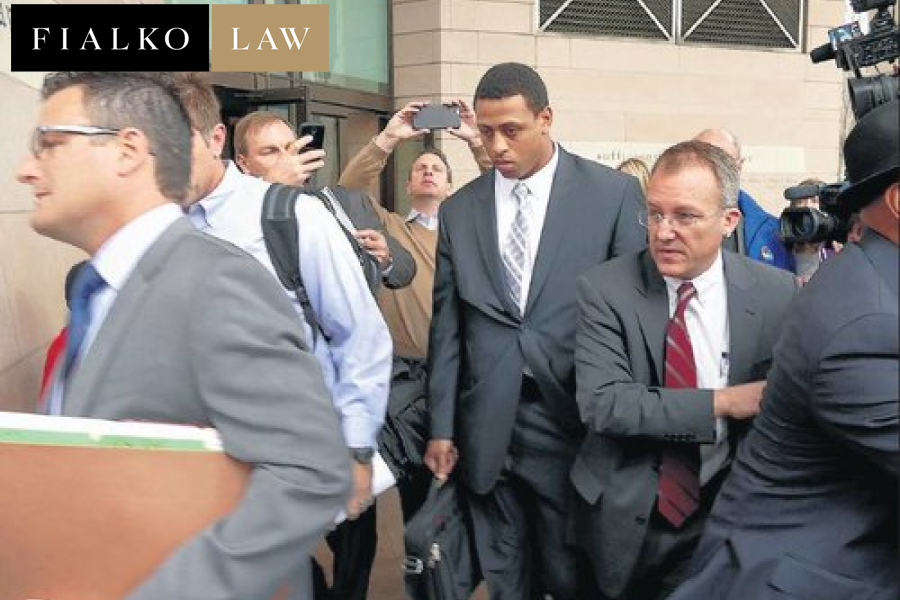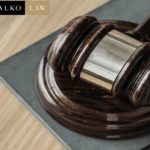
Domestic Abuse Case Against Hardy Unravels
Source: Gordon, Michael, et al. “Domestic Abuse Case against Hardy Unravels.â€Â Charlotte Observer, 10 Feb. 2015, pp. 1A–5A
State’s key witness, Nicole Holder, could not be found to testify
Carolina Panther Greg Hardy exits the Mecklenburg County courthouse Monday with his attorneys, Frank Maister, left, and Chris Fialko, right. In July, Hardy was convicted by a judge of assaulting and threatening to kill Nicole Holder, a former Uptown waitress.
Greg Hardy’s domestic abuse charges were abruptly dismissed Monday, but the case against the Carolina Panthers’ Pro Bowl defensive end appears to have been unraveling for weeks.
That’s because the state’s key witness – Hardy’s former girlfriend Nicole Holder – told prosecutors months ago she didn’t want to cooperate and has been avoiding the repeated efforts of the Mecklenburg County District Attorney’s Office to find her and compel her to testify.
In July, Hardy had been convicted by a judge of assaulting and threatening to kill Holder, a former uptown waitress. But District Attorney Andrew Murray said his office hasn’t talked to Holder since November. And despite what Murray described in court as “extraordinary measures” to locate her, they still do not know where she is.
The prosecutor also told Superior Court Judge Robert Sumner that Holder had agreed to a settlement with Hardy, which heads off any civil lawsuits she might file in connection with the case. No dollar amount was mentioned.
Victims and witnesses routinely stop cooperating in domestic-abuse cases and prosecutors still take the cases to court. Murray, though, said the Hardy case was different. He also appeared to raise doubts about Holder’s credibility in a statement to the judge.
But other details also raised unanswered questions about prosecutors’ handling of the case. Hardy’s defense team announced an appeal of his conviction before leaving court in July. but Murray said prosecutors only “recently” had compared what Holder told police the night of the alleged assault with testimony at Hardy’s first trial.
That’s because prosecutors didn’t have a trial transcript. Hardy’s defense team did – attorney Chris Fialko hired a court reporter at Hardy’s trial in District Court where transcripts are not normally prepared. According to court records, Fialko also fought the prosecution’s request for a copy of the transcript in the weeks leading up to Hardy’s trial this week.
Murray’s Office would not elaborate on what prosecutors found when they compared Holder’s statements, but the district attorney said in court that with Holder unavailable, they “did not have sufficient legal basis” to enter her statements to police as evidence.
Several legal experts around town speculated that prosecutors spotted inconsistencies that prevented them from building their case around Holder’s former accounts. To enter an unavailable witness’ prior testimony and statements as evidence. prosecutors have to “vouch” for its truthfulness, said Charlotte defense attorney George Laughrun.
“If they’re seeing something in the evidence that gives them pause, they may have been placed in an ethical dilemma where they don’t want to vouch for their witness.”
Defendants also have the right to confront every witness, said Charlotte attorney Jim Cooney. Fialko may have successfully blocked Holder’s previous testimony and statements to police as a violation of his constitutional protections.
Besides, Cooney added, “Reading a two-hour transcript (from the previous trial) is about the worst way to present evidence that I know of, and if she’s not there, it presents substantial doubts about her credibility.”
Hardy, who came to court in a dark, pin-striped suit and white $600 Balenciagas tennis shoes, appeared impassive as Murray announced that the charges against the 26-year-old had been dropped. Neither he nor Fialko would answer questions.
Holder’s location remains a mystery. Murray says police staked out the addresses where she was believed to be living and requests to relatives to have her come forward. Her attorney, Daniel Zamora, had not cooperated, Murray said. Zamora did not return phone calls from the Observer on Monday.
In July, with Holder at his side, Zamora said Hardy’s conviction “sent a strong message to the people of Mecklenburg County that it doesn’t matter if you’re an average Joe or if you’re a professional athlete that plays for the Carolina Panthers: If you assault a woman and you communicate to that woman that you will kill them, you will be arrested, you will be prosecuted, and you will be convicted.”
Hardy has been on the NFL’s exempt list since mid- September. He played in only one game in the 2014 season but was paid more than $13.1 million. He becomes a free agent next month.
NFL spokesman Brian McCarthy said Monday that Hardy’s status remains unchanged until league officials “fully review the matter”.
Late in the day, the Panthers said the team was aware that charges against Hardy had been dropped. “Greg remains on the Commissioner’s Exempt List, and the NFL has advised us to allow it to complete its review under the Personal Conduct Policy,” the statement read. “There is no change in his status at this time.”
Original Conviction Appealed
Hardy’s abuse case was one of several involving professional football players that dominated the headlines for much of the NFL season.
Holder’s allegations included a description of an enraged Hardy throwing her into the bathtub of his uptown condominium and tossing her onto a futon covered with semi-automatic weapons. Hardy later turned in about 10 weapons at the order of a judge.
As Murray left the courthouse for the short walk up Fourth Street to his office, he was surrounded by a school of media. He again declined to answer questions. The Observer later sought additional information about the search for Holder, the decision to drop the charges and whether prosecutors considered launching a witness-tampering investigation when they learned of the settlement between Holder and Hardy, among other topics.
Witness tampering is a felony under North Carolina law, but it is also a charge that is rarely prosecuted, recently retired Superior Court Judge Richard Boner said Monday.
That’s because investigators need proof of a “quid pro quo,” that money changed hands to keep a witness from testifying in a criminal case. A civil settlement could have the same net effect but not meet the requirements of a tampering charge, Boner said.
“If you have proof of quid pro quo, then you’ve got some possible criminal liability. It’s the district attorney’s call. There’s a fine line,” Boner said.
As Hardy left the courthouse, at least one reporter asked whether he’d left the impression that he paid Holder off. He declined to comment on that and other questions.
Fialko did the same. “Don’t make me do a Marshawn Lynch on you,” he told the Observer as he left the courthouse, a reference to the Seattle Seahawks player who refused to talk with the media at the recent Super Bowl.
Hardy and his entourage drove off in a Honda Accord.
Staff writer Johnathan Jones contributed.














